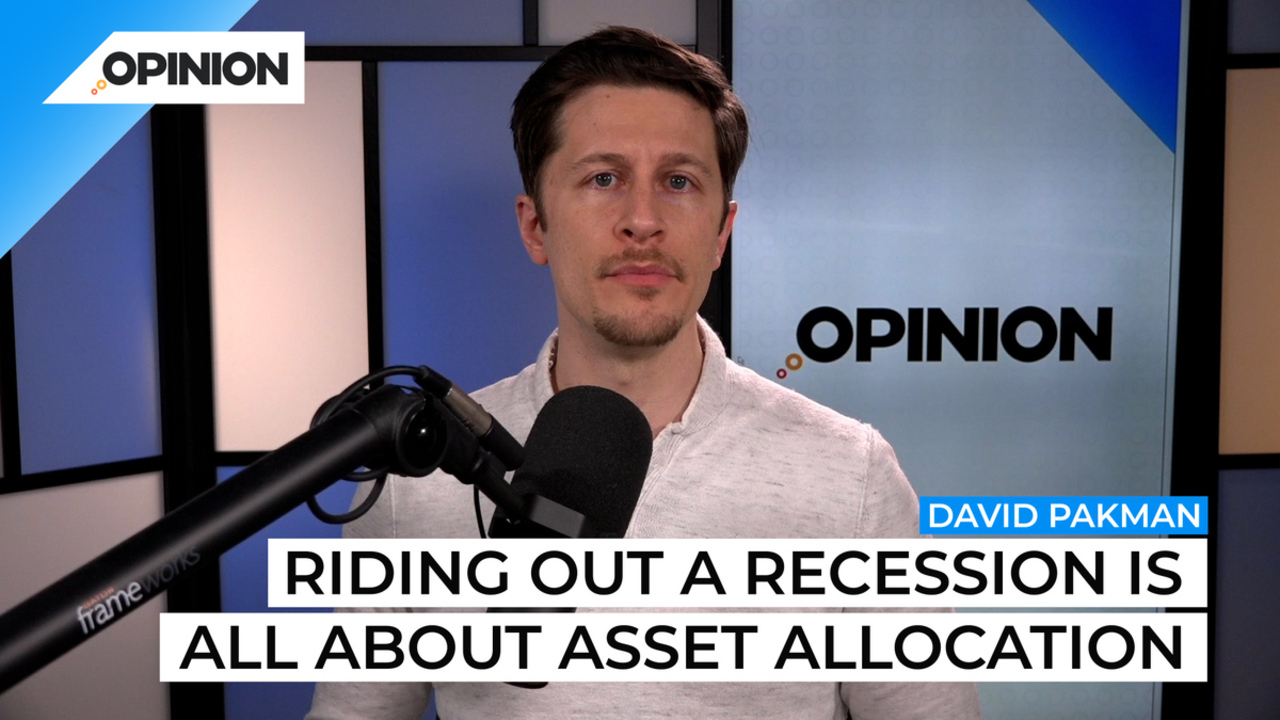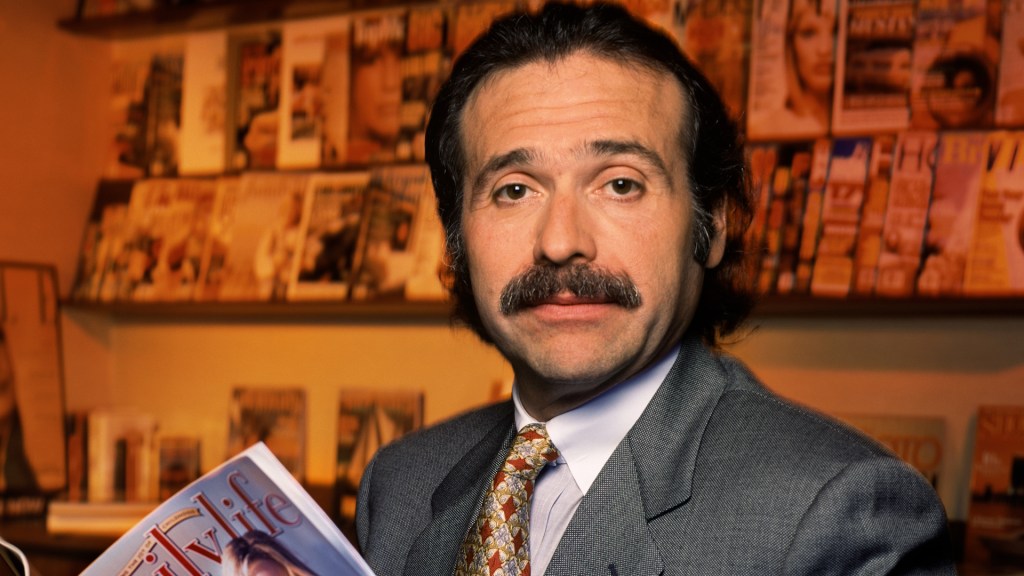
Commentary
-
Our commentary partners will help you reach your own conclusions on complex topics.
Is the United States heading towards a major recession? A number of you forwarded to me a recent analysis, we might call it done, by Goldman Sachs. Whatever you think about Goldman Sachs, at least in the context of this sort of thing, they are considered important when they make predictions.
The latest Goldman Sachs analysis or forecast indicates that they believe there is a 35% chance of a recession in the United States within the next 12 months, up from their previous estimate of just 25%. Now, there is a very partisan aspect to this, which I want to step outside of, but I wouldn’t be doing my job if I didn’t tell you what it was. And the partisan aspect of this is that very often, Democratic voters are more likely to think a recession is coming when there’s a Republican president, and Republican voters are more likely to think a recession is coming when there is a Democratic president. Now, is there an objective reality about recessions and a partisan basis? There is, and I’m not going to allow you to lie to you about that either. The truth is that just about every economic indicator favors Democrats in the White House.
You can look up every one of these yourself, and I encourage you — don’t take my word for it. But stock market return on average is higher under Democratic presidents. Job creation, on average, is higher under Democratic presidents. .The unemployment rate is, on average, lower under Democratic presidents. GDP growth is higher under Democratic presidents. Recessions are more common under Republican presidents. And on average, inflation is lower during Democratic presidents. This is not a matter of opinion. But you should fact check me — don’t believe it, just because I’m saying it to you.
This now gets us to these recession predictions. I will be honest, I basically ignore them completely. And there’s two reasons why. Number one, humans, we, are notoriously bad at making these predictions. And of course, when eventually there’s going to be a recession, you can always predict a recession is coming, and eventually you’ll be right. It doesn’t make you much of a fortune teller. In fact, there have been people predicting a massive recession going back almost a decade to 2014.
Now, we did have that several month decline at the start of COVID, recovered very quickly. There are some who say that was the recession we were predicting. Seems a little bit soft, given that it was so short, and we recovered from it so quickly. But one of the things about the economic system we have is that unless something changes, there’s always been another recession eventually. And that’s one reason why I don’t pay much attention to “well, it’s coming in 12 months or 18 months” or whatever. In 2016, a ton of people were saying a recession was coming, didn’t happen. Okay, so that’s reason number one, why I don’t put too much stock into it.
There’s a second reason as well. And this gets really into personal finance. If you have thought through your personal finance approach, I can’t think of anything that I would do if I believe a recession is coming. And I’ll tell you what I mean by that, and there’s an exception, and we will get to the exception. The most important decision most people make when it comes to personal finance is about asset allocation. And when I mean asset allocation, I mean, how much, what percent, we’re talking percentages here, no matter how much money you’re making, or you have, what percentage of your assets do you want to keep in cash based on your risk tolerance and your financial needs?
What percentage of your assets do you want invested? And of the invested assets, how much do you want in stocks versus in bonds? And there’s lots of philosophies around this. If you’re someone who owns or wants to own real estate, what percentage of your assets could or shouldn’t be in real estate? What about cryptocurrency and alternative assets? Okay, once you’ve decided that, you really wouldn’t make any moves if you believed a recession was coming because your asset allocation is already reflective of your risk tolerance.
When you say, you know what, for my risk tolerance, I want 65% in stocks and 35% in bonds — we don’t even have to get into the details of what this means — when you decide that, the reason you’re choosing that is because of your risk tolerance and the understanding that there could be a recession at any time and if there is, I might only want 65% exposure to stocks. Cash — well, for me, I’ll speak about myself, I keep roughly eight to 10% of my assets in cash at any given time. That’s high for many people, but I have reasons why I do it.
If you’re comfortable and dialed in at eight to 10% in cash, you wouldn’t do anything different if you believe a recession is coming. Now, what are the exceptions to this? The biggest exception to this “what would you do anyway, because you believe a recession is coming?” is if you have reason to believe that your particular job is at risk, or your business, if you own a business, is at risk, if such a recession were to hit. For example, I’m making this up now, if you run — this may not even be, this may be recession proof, but imagine that you run a high-end dog walking service of some kind, where, you know, you provide some kind of luxury dog walking service, you might say to yourself, you know, high end dog walking is really an optional thing. If there’s a recession, most of my customers or many of my customers might decide, I’ll get a cheaper dog walking service or I’ll walk the dog myself. That would be a specific reason that you think your job and income might be at risk based on a recession.
And thus, you might say, I’m going to save a little more cash right now, in order to protect myself if that were to happen, to not end up having to sell stocks, because it’s an example. But for those two reasons that humans are terrible at predicting recessions, and that it wouldn’t change my financial approach, anyway, I really pay very little attention to it. Might there be a recession in the next year? Sure. Did we need Goldman Sachs to tell us that? No, we always know that there could be a recession.
-
As trials persist, Trump will become increasingly unhinged
On Monday, April 22, former President Donald Trump is scheduled to appear in a New York court for the start of opening statements in his hush money criminal trial. Trump faces 34 felony charges of falsifying business records related to an alleged scheme aimed at suppressing negative information prior to the 2016 election. Despite this…
-
RFK’s true goal is to elect Donald Trump
When Robert F. Kennedy, Jr. announced his intention to run as a presidential candidate, many Americans assumed that he would run as a Democrat. But some of his political positions, including his opposition to vaccines and mask mandates during the COVID-19 pandemic, aligned him more with Donald Trump’s MAGA camp. In the end, Kennedy chose…
-
Courts must end special treatment for criminal Trump
A New York appeals court reduced Donald Trump’s bond payment from $464 million to $175 million on Mar. 25. The reduction came after Trump had already been allowed significant delays in numerous court cases. The former president faces a total of 91 felony criminal charges and could theoretically face a prison sentence of over seven…
-
Biden could beat Trump even without Florida
In March, former President Donald Trump easily won Florida’s GOP primary, clinching all 125 delegates. While numerous strategists saw the romp as another sign of Trump’s unwavering GOP dominance, some noted his support among the state’s Republican voters may not be as strong as before. Despite Trump’s success, other names on the ballot, such as…
-
GOP’s Biden investigation still has no evidence, no crime
In December 2023, House Republicans voted to open an impeachment inquiry into President Joe Biden to determine if he “improperly benefited” from his son’s alleged business deals. President Biden quickly fired back, stating that House Republicans were “choosing to waste time on this baseless political stunt” instead of doing their jobs. Straight Arrow News contributor…
Latest Opinions
-
 Getty Images
Getty Images
How Martha’s Vineyard migrants secured special visas intended for victims of crime
-
 Getty Images
Getty Images
Collateral damage: Why Apple’s iPhone sales are getting crushed in China
-
 Getty Images
Getty Images
FTC votes to ban non-compete clauses
-
 Reuters
Reuters
Tennessee legislators pass bill allowing teachers to carry guns in classroom
-
 Getty Images
Getty Images
Senate passes $95B aid package; TikTok bill included
Popular Opinions
-
In addition to the facts, we believe it’s vital to hear perspectives from all sides of the political spectrum.


